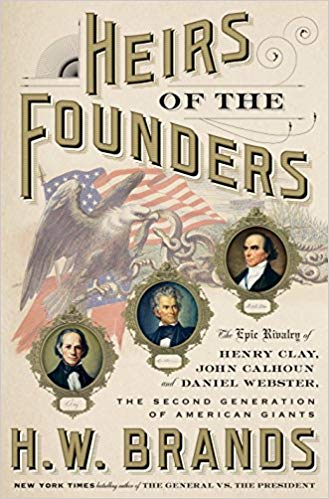You have /5 articles left.
Sign up for a free account or log in.
 Heirs of the Founders: The Epic Rivalry of Henry Clay, John Calhoun and Daniel Webster, the Second Generation of American Giants by H. W. Brands
Heirs of the Founders: The Epic Rivalry of Henry Clay, John Calhoun and Daniel Webster, the Second Generation of American Giants by H. W. Brands
Published in November of 2018.
Books are conversations. Links in a chain. Nodes in a network.
Decisions about the next book we read are filtered through books that have come before. One book leads to another. Tomorrow’s books depend on today’s choices and yesterday’s selections.
Sometimes the path from one book to another is murky. The connections between what we are reading now and what we have read in the past not obvious. Other times the causality is clear.
The reason that I read H.W. Brands new book Heirs of the Founders is because I recently finished (and reviewed) These Truths, Jill Lepore’s one-volume history of the US.
I went from Lepore to Brands because in reading These Truths I realized my darkest US history blindspot lies between the period after the Revolution and before the Civil War. These Truths provides an overview of the years between the Founders and Lincoln. Brands fills in the details.
Heirs of the Founders tells the story of the early-to-mid 19th century America through the political lives of Daniel Webster (1782-1852), Henry Clay (1777-1852, and John C. Calhoun (1782-1850).
The overarching theme of Heirs of the Founders, as in These Truths, is the legacy of slavery. There are those who will argue that the ultimate and proximate causes of the Civil War are not slavery, but economics.
Heirs of the Founders does an excellent job of showing how the slave system and the Southern economy were inseparable. The attempts of Clay (and later Webster) to hold together the Union by defending the Southern slaveholding status quo were not only morally indefensible, they were also destined to fail.
Brands is something of a history brand. You know that a Brands book is going to find that right balance between narrative verve and historical heft. Academics like Brands, a professor at UT Austin, give lie to the idea that scholarship and entertainment need be mutually exclusive.
In these crazy political times, I find myself drawn more and more back to reading US history. (Any other history majors lurking in our IHE community?). If we can’t agree on the present, or make good predictions about the future, at least we can try to know the past.
Learning history is hard, mostly because to you have to learn an awful lot of it before figuring out how things all fit together. Books like Heirs of the Founders and These Truths give us hope that we can make some sense of how we got to where we are now.
What percent of a good nonfiction diet should include books by historians?
What is the best book of history that you have read recently?
Why might those who work in technology be particularly susceptible to the pull of reading history?
What are you reading?




